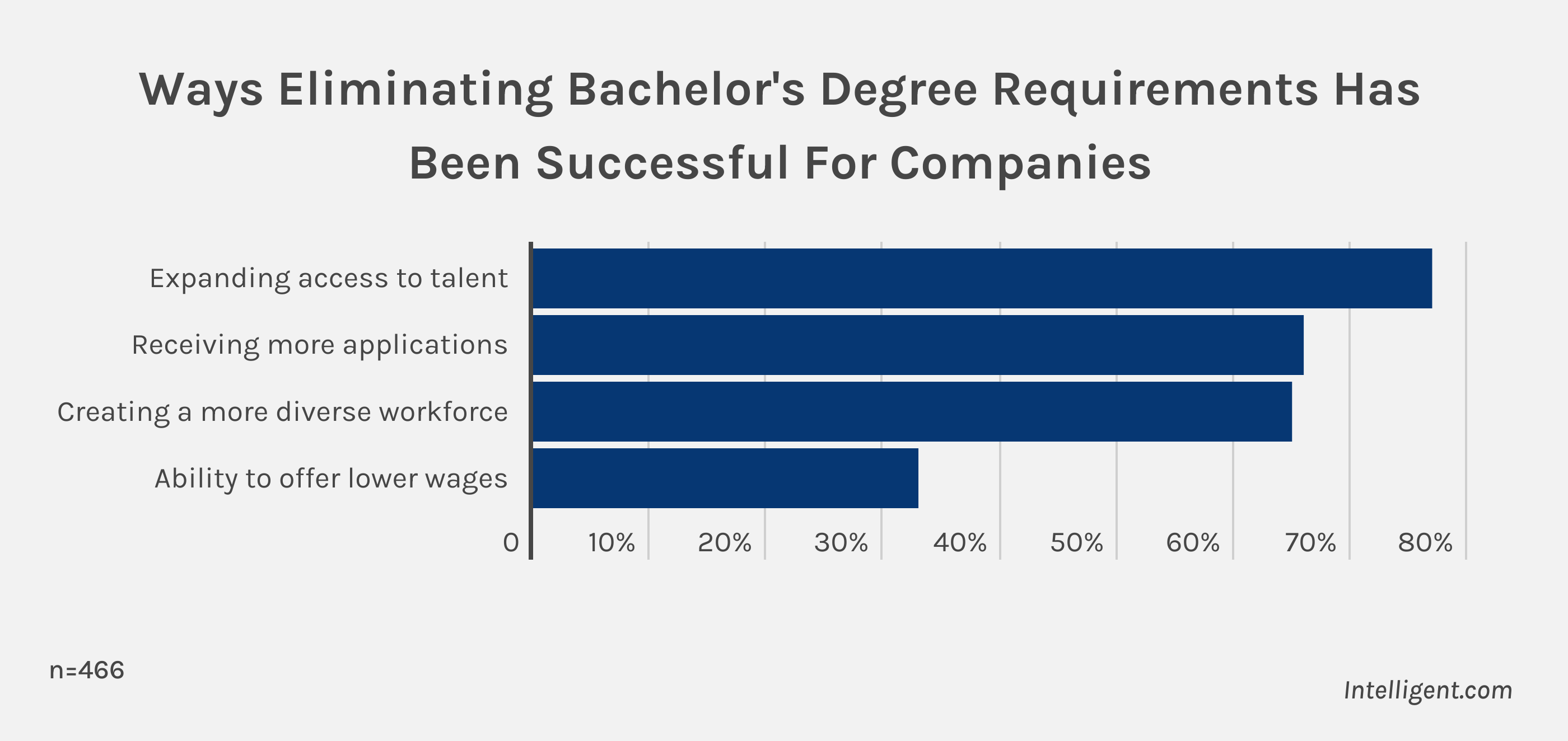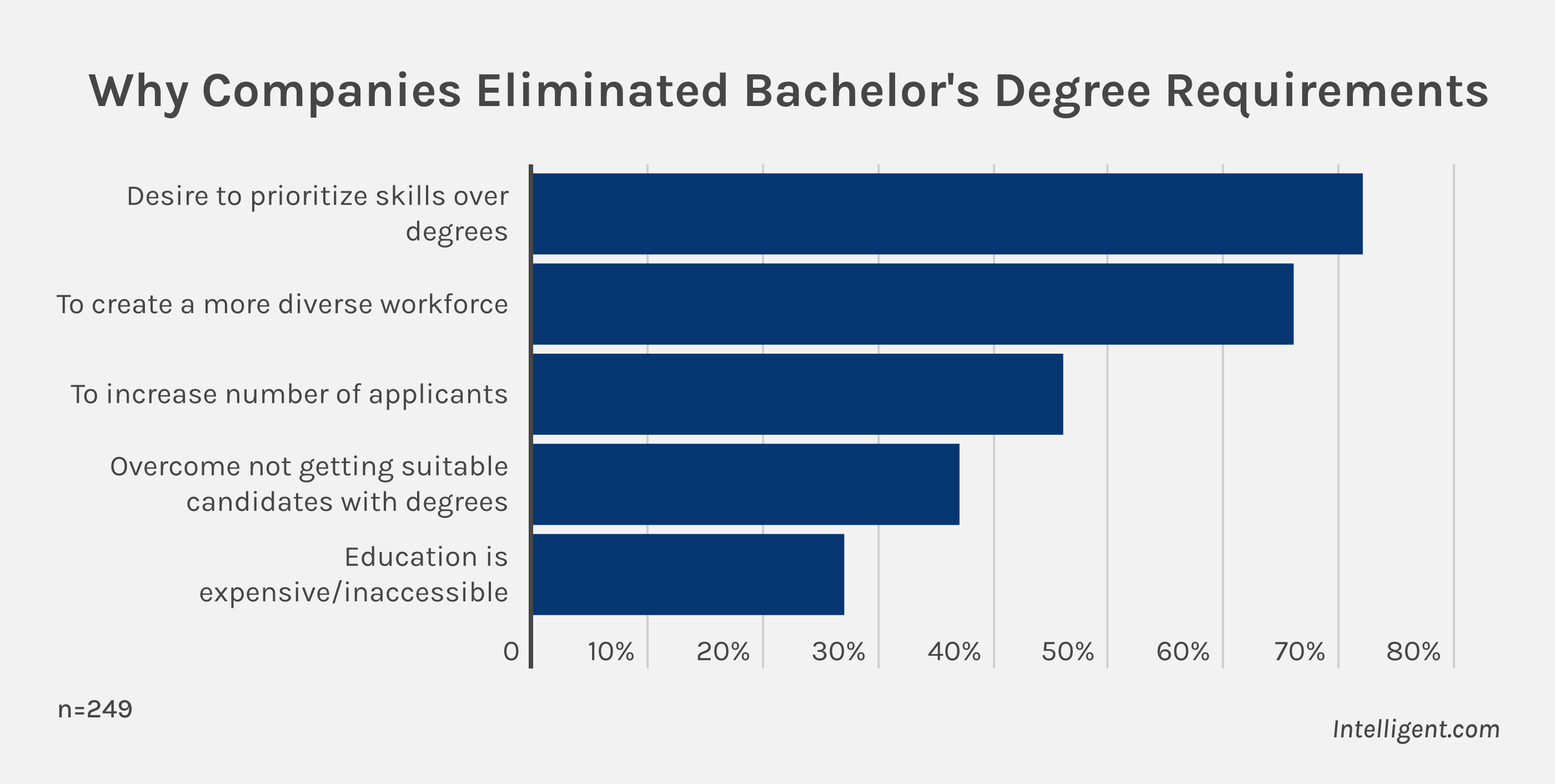As the job market evolves, a growing number of companies are eliminating bachelor’s degree requirements for certain positions.
To learn more about this trend, Intelligent.com recently surveyed 750 U.S. business leaders.
What we found:
- 33% of companies eliminated bachelor’s degree requirements so far in 2024
- 25% of companies will eliminate or continue to eliminate bachelor’s degree requirements by 2025
- Top reason for cutting degree requirements is a desire to prioritize skills over degrees
- 3 in 4 business leaders at companies that have removed requirements say it’s been beneficial to the company
1 in 3 Companies Stopped Requiring Bachelor’s Degrees For Some Positions This Year
So far this year, 33% of surveyed business leaders say their company has eliminated the requirement for a bachelor’s degree for certain roles. On the other hand, 63% say the company has retained the requirement, while 4% were unsure.
Among the companies that have removed the degree requirement, 59% have done so for entry-level positions, 54% for mid-level roles, and 18% for senior-level roles.
While these companies have removed requirements for some roles, all still require a bachelor’s degree for at least a few. More specifically, 40% of business leaders indicate that many roles at their company still have this requirement, while 43% say some roles do, and 16% report that few roles still require a bachelor’s degree.
Top reason is a desire to prioritize skills over degrees
The primary reasons companies have eliminated a bachelor’s degree requirement for some roles include deciding to prioritize skills over degrees (72%), aiming to create a more diverse workforce (66%), and wanting to increase the number of applicants for these roles (46%).

“Eliminating bachelor’s degree requirements from the hiring and recruiting process is becoming increasingly popular across many industries,” says Chief Education and Career Development Advisor Huy Nguyen. “The trend shift shows a broader recognition that practical skills, real-world work experiences, and the ability to self-learn can be more important measures of potential success than four years of formal college education in many job functions.”
“By removing degree requirements, companies gain access to larger and more diverse pools of talent, especially when looking to fill roles in industries facing labor shortages or seeking specialized skills that students may not have learned in college. Many businesses that have done this report that they receive more job applications, which allows for a more robust and competitive candidate selection process, allowing hiring managers to choose from more qualified applicants.”
3 in 4 business leaders say removing requirements has been beneficial
The elimination of degree requirements has been perceived as successful by a majority of companies, with 29% rating it as very successful and 47% as successful. Around 17% have found it to be somewhat successful, and only 2% consider it not successful at all. An additional 5% are unsure of its success.
Regarding specific benefits, 83% of business leaders report that eliminating degree requirements expands access to talent, while 69% note it helps create a more diverse workforce. Additionally, 64% receive more applications as a result. A smaller percentage, 31%, mention that it allows them to offer lower wages.

Majority of Business Leaders Favor Work Experience Over Degrees
During the hiring process, 66% of business leaders say they highly value whether a candidate has a bachelor’s degree, and 31% say they value it somewhat.
However, when considering the practical skills and experience needed for job performance, 77% of business leaders state their company is very likely (27%) or likely (50%) to favor experience over college education. This shift highlights a growing recognition of the value of hands-on experience and practical knowledge in the workplace. In contrast, 12% are not very likely, and 1% are not likely at all to favor experience over formal education. Additionally, 10% are not sure, reflecting some uncertainty or variability in hiring practices.
Additionally, when asked whether workers should prioritize work experience over obtaining a bachelor’s degree, 62% of business leaders answered that they should.
“Real-world experience and practical skills are often viewed as more valuable than a formal education alone in today’s job market. While a college degree provides individuals with a good foundation of theoretical knowledge, the information and strategies learned are quickly outdated as industry trends shift rapidly and new technology emerges to meet these demands.
“Candidates with hands-on experience bring relevant skills and industry knowledge that can make an immediate impact on the business. Additionally, these experiences may make them more adaptable and resilient, giving them a higher chance for success in the role they are applying for,” says Nguyen.
1 in 4 Companies Plan to Rid Bachelor Degree Requirements by 2025
Looking ahead to 2025, 25% of business leaders say their company plans to eliminate or further eliminate bachelor’s degree requirements for some positions, while 56% say their company does not have such plans, and 19% are unsure.
Methodology
This online poll was commissioned by Intelligent.com and conducted on Pollfish in June 2024. In total, 750 U.S. business leaders completed the survey.
Demographic criteria were used to ensure qualified respondents. This criteria included age (25+), household income (>$50,000), organizational role (c-level executive, human resources manager, director, president, owner/partner, and senior management), company size (>10), and education (technical college, college, or postgraduate).